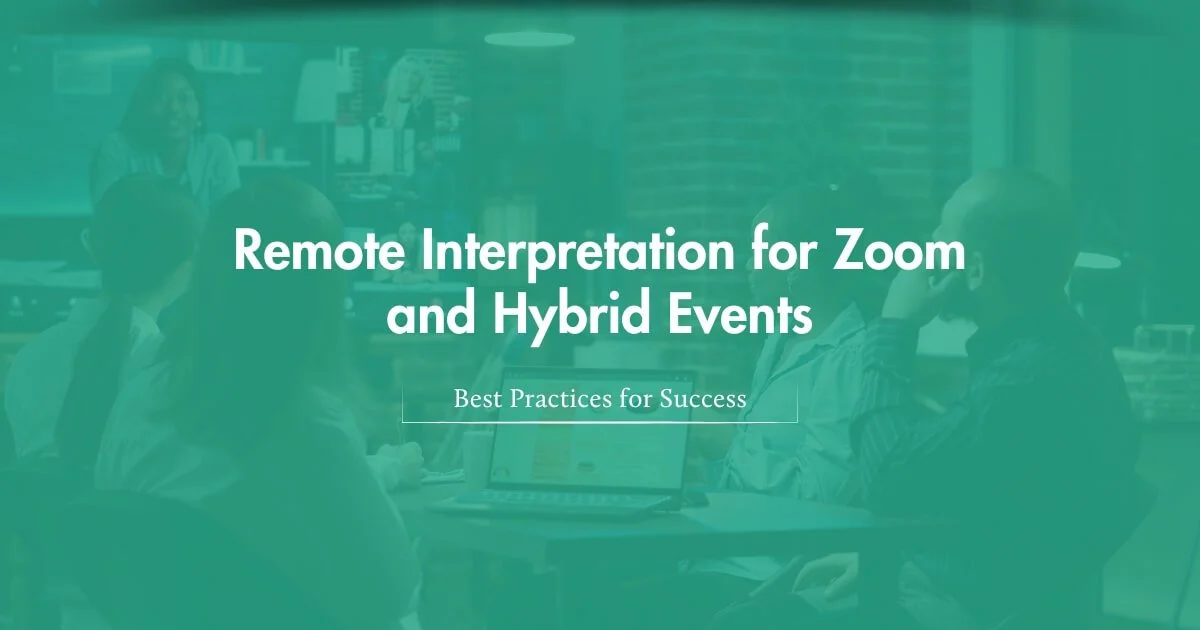Remote Interpretation: Best Practices for Zoom and Hybrid Events
Why Remote Interpretation Matters
With the rise of hybrid and virtual meetings in Singapore and around the world, remote interpretation has become indispensable. Whether you're hosting a multilingual corporate meeting, webinar, or global conference, ensuring all participants can understand and engage in real time is crucial. Platforms like Zoom have built-in interpretation features, but poor planning or technical issues can undermine your event's success.
In this blog post, we’ll explore the best practices for remote interpretation—especially on Zoom and in hybrid event settings—so your communication remains seamless, inclusive, and effective.
🔍 What is Remote Interpretation?
Remote interpretation refers to the delivery of live interpretation services through virtual platforms. This can include:
Simultaneous interpretation via Zoom
Consecutive interpretation for interviews or Q&A sessions
Hybrid events combining in-person and virtual audiences
It allows businesses and organizations in Singapore to host multilingual meetings without needing interpreters physically on-site.
🎯 Best Practices for Zoom Interpretation Services
1. Choose the Right Zoom Plan and Enable Language Interpretation
Zoom’s interpretation feature is only available on its Business, Education, and Enterprise plans. Make sure:
You’ve enabled the “Language Interpretation” setting in your Zoom account.
Interpreters are added as panelists or participants before the meeting.
Each interpreter is assigned to the correct language channel.
📌 Pro Tip: Always do a dry run to ensure everyone understands the tools and roles.
2. Hire Certified and Experienced Interpreters
For high-stakes meetings, such as legal, healthcare, or corporate negotiations, always hire certified professional interpreters with proven experience in your industry.
💡 For Singapore-based events, look for interpreters familiar with local dialects, terminologies, and cultural nuances.
3. Conduct a Technical Check
Nothing derails a virtual event faster than a tech glitch. Ensure:
All speakers, hosts, and interpreters have a stable internet connection.
Use high-quality headsets and microphones.
Share backup dial-in options in case someone loses connectivity.
Test the language channels and screen-sharing capabilities.
4. Share Presentation Materials in Advance
Send scripts, presentations, and key talking points to your interpreters at least 48 hours before the event. This allows them to:
Familiarize themselves with the content and jargon.
Translate industry-specific terminology ahead of time.
Prepare glossaries to ensure terminological consistency.
5. Provide Clear Instructions to Attendees
Not all participants are familiar with Zoom’s interpretation feature. Use slides or pre-event emails to explain:
How to access the language selection button.
How to switch between original and interpreted audio.
What to do if they lose audio or can’t hear the interpreter.
🧭 Pro Tip: Have a bilingual tech support person available during the event.
🔀 Best Practices for Hybrid Events
Hybrid events (a mix of in-person and virtual participants) come with added challenges. Here’s how to address them:
1. Equip the Venue for Interpretation
Use soundproof booths for on-site interpreters.
Set up IR receivers or FM systems for attendees listening to interpretations.
Sync in-person AV feeds with Zoom to ensure seamless transitions.
2. Appoint a Technical Coordinator
Have someone monitor the:
Audio feed for both virtual and in-person attendees.
Interpreter handovers (if multiple interpreters are rotating).
Connectivity between live and online streams.
🌐 Use Cases for Remote Interpretation in Singapore
Remote interpretation is especially valuable in:
Corporate AGMs with international shareholders
Government webinars reaching multilingual citizens
Legal proceedings or arbitration hearings
Virtual trade shows and industry panels
In a multilingual business environment like Singapore, providing professional interpretation shows commitment to inclusivity and effective communication.
💼 Why Choose One Language Pte Ltd for Your Remote Interpretation Needs?
One Language Pte Ltd offers:
Native and certified interpreters across 20+ languages
Experience with Zoom, Microsoft Teams, Google Meet, and hybrid platforms
Real-time support for technical setup and event execution
Singapore-focused expertise and local support
Whether you're planning a fully remote meeting or a hybrid seminar, we ensure every voice is heard—clearly and professionally.
Plan Ahead, Communicate Clearly, and Partner with Experts
Remote interpretation is not just a technical task—it’s a communication strategy. With proper planning, the right interpreters, and expert support, you can ensure your Zoom and hybrid events are multilingual, inclusive, and impactful.
📈 Boost Your Event Success with Professional Interpretation in Singapore
Ready to make your next event truly global? Contact One Language Pte Ltd today to discuss remote interpretation solutions tailored for your industry.
📞 +65 9176 2308
📧 info@one-language.com
🌐 www.one-language.com


